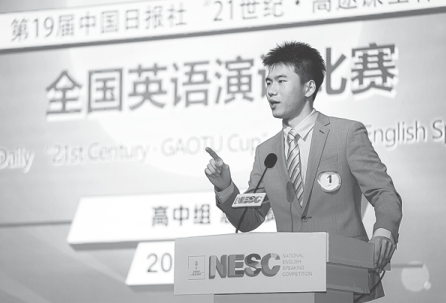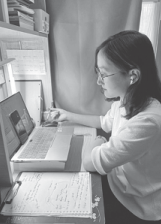Raising their voices
An international public-speaking contest gives Chinese youngsters like this year's winner Yang Kangqi a platform to tell their stories to the world, Chen Huan reports.

A Shanghai university student, Yang Kangqi, has become the third person from the Chinese mainland to win the International Public Speaking Competition organized by the English Speaking Union in London.
In her speech on May 13, Yang, an undergraduate at Shanghai Medical College of Fudan University, said that, as we call mothers heroines, we are constantly asking too much of them, often without giving anything in return. She added that women need to be given space to be themselves, rather than just mothers.
"This superhero movie needs to end … they (women) win because they're finally embraced as ordinary people with their own stories, emotions and dreams. That is when our heroines reach their truly victorious' happy ever after'."
The previous Chinese mainland winners of the competition, which was held online this year because of the pandemic, were Liu Xin, a China Global Television Network presenter, in 1996, and Xia Peng, who co-founded Zhuomo Cultural Media of Beijing, which owns the English-learning app Youlinyouke, in 2005.
"We thought (Yang's) arguments had the most interesting content and created the most thought-provoking ideas … with an excellent and engaging presentation," Robert Buckland, chairman of the judges, said of her speech.
Talking to China Daily, Xia congratulated Yang and says her win demonstrated that "the world needs China, as much as China needs the world".
"I am happy to see that the world acknowledges her victory and that Yang's efforts prove that she is well worth the title."
The International Public Speaking Competition brings together students aged 16 to 20 from around the world. To take part in the preselection contest, Chinese contestants must have won the first prize (usually top 12 in the national finals) in the China Daily 21st Century Cup National English Speaking Competition. Yang won the national champion of this competition's college group in 2021.
The 21st Century Cup has served as the national qualifying competition since it was established in 1996, and it aims to provide a stage for Chinese youth to better communicate with the world and tell authentic stories about China.
On a global stage, speakers need to formulate strong and sensible statements to convey that China is engaging in global issues, Yang says, such as issues including the pandemic, the environment, gender equality and people's well-being, and then incorporate Chinese culture or Chinese wisdom into the speech, "to combine a unique perspective from our culture to address the issues".
She attributed her success to her coach, Professor Shi Lina of Fudan University, who has been training students in public speaking for 20 years. Shi stresses three main points to best tell a Chinese story: passion, being genuine and developing the required skills.
As a medical student, Yang's passion lies in that field, and her knowledge helped her to talk about topics related to the medical field in the earlier rounds of the competition. By using her voice for public speaking, she can bring more public attention to people in need of extra care, she says.
Shi says of Yang: "She fits all my expectations for the new generation of Chinese youth and beyond. I believe her performance on the world stage, with a medical student's scientific attitude and humanistic touch, must have inspired the audience and presented a very positive image of China to the world."
Teamed with Yang was the national champion of the China Daily 21st Century Cup National English Speaking Competition's senior high school group, Wang Licheng of Shanghai Foreign Language School that is affiliated to Shanghai International Studies University. He used the international platform to tell stories that relate to the uniqueness of Chinese culture.
In a cultural exchange session, he told participants about his name.
"In China, the family name is put before the given name, which shows our attachment to family.… Behind the second character of my name, li, is a story from Chinese Taoism that embodies the philosophy of 'the usefulness of uselessness'.
"The Chinese equivalent of the word 'everyone' is dajia, which, semantically, means big family. This builds up the traditional Chinese concept of tianxia, that the world is a big family, which is different from that in the West."
Wang's primer on Chinese language hit the mark with his audience, many of whom wanted more details on how Chinese characters are formed.
"Chinese characters, cuisine culture, finger counting-they seem habitual to us, but can be great topics to open a conversation or for cultural exchange, and to demonstrate the uniqueness of our history and culture," Wang says. "So why not make good use of them to catch their interest?
"It was a great opportunity for me to see the world and to express myself. As Chinese Gen Zers (people born in the late 1990s or the early 21st century) born in the age of globalization, by knowing ourselves and empathizing with others, we can be good contributors to the rejuvenation of our civilization and the prosperity of the world."



Today's Top News
- China, US gear up for pivotal trade talks
- Nation boosts global AI governance
- Policy support helps stabilize industrial profit
- China's industrial profits down 1.8% in H1
- Thailand responds to Trump's ceasefire call
- Recall vote shows DPP's manipulation runs against Taiwan people's will: mainland spokesperson






























